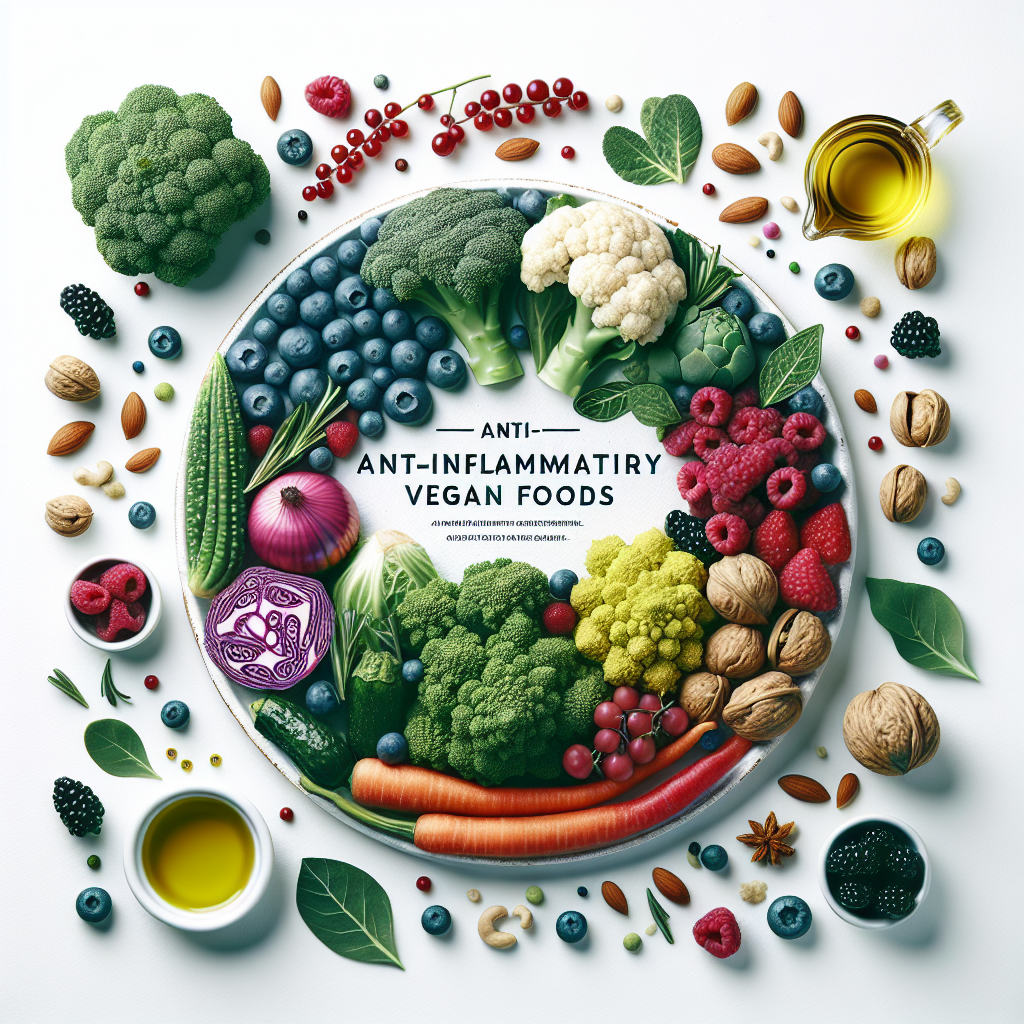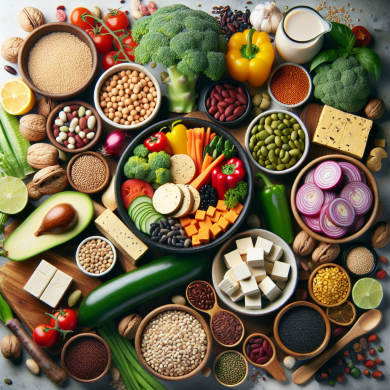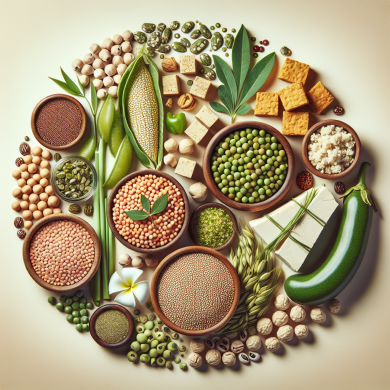Top Anti-Inflammatory Vegan Foods to Try Today
Inflammation is a natural response of the body’s immune system to injury or infection. However, when inflammation becomes chronic, it can lead to numerous health issues, including heart disease, diabetes, and arthritis. A diet rich in anti-inflammatory foods can help manage and reduce chronic inflammation. For those following a vegan lifestyle, there are plenty of plant-based options that not only combat inflammation but also provide essential nutrients to support overall health. Here are some top anti-inflammatory vegan foods to incorporate into your diet today.
Turmeric
Turmeric, a vibrant yellow spice commonly used in Indian cuisine, is renowned for its anti-inflammatory properties. The active compound in turmeric, curcumin, is a powerful antioxidant that can inhibit the molecules involved in inflammation. Studies have shown that curcumin can be as effective as some anti-inflammatory drugs without the adverse side effects. To enhance the absorption of curcumin, pair turmeric with black pepper or a healthy fat like olive oil. Adding turmeric to curries, smoothies, or teas is an excellent way to benefit from its anti-inflammatory effects.
Ginger
Ginger is another potent anti-inflammatory food that has been used for centuries in traditional medicine. It contains gingerol, a bioactive compound responsible for its anti-inflammatory and antioxidant effects. Ginger can help reduce muscle pain, soreness, and inflammation. It can be used fresh, dried, or as a supplement. Adding freshly grated ginger to stir-fries, soups, or teas can enhance flavor while providing anti-inflammatory benefits.
Berries
Berries such as blueberries, strawberries, and raspberries are packed with antioxidants, particularly anthocyanins, which help reduce inflammation. These fruits are not only delicious but also rich in vitamins, fiber, and phytochemicals that support health. Incorporating a variety of berries into your diet can help lower the risk of chronic diseases linked to inflammation. Enjoy them as a snack, in smoothies, or as a topping for oatmeal and salads.
Leafy Greens
Leafy greens like spinach, kale, and Swiss chard are nutrient-dense foods that contain high levels of vitamins, minerals, and antioxidants. They are particularly rich in vitamin K, which has been shown to help reduce inflammatory markers in the body. These greens are also a good source of omega-3 fatty acids, which are known for their anti-inflammatory effects. Including a variety of leafy greens in your meals, whether in salads, smoothies, or sautés, can significantly contribute to reducing inflammation.
Nuts and Seeds
Nuts and seeds such as walnuts, flaxseeds, and chia seeds are excellent sources of healthy fats, fiber, and protein. They are rich in omega-3 fatty acids and alpha-linolenic acid (ALA), both of which have been shown to reduce inflammation. Nuts also contain magnesium, L-arginine, and vitamin E, which are anti-inflammatory compounds. A handful of nuts or seeds as a snack or sprinkled over dishes can provide these benefits and promote heart health.
Olive Oil
Extra virgin olive oil is a staple in the Mediterranean diet, which is known for its anti-inflammatory and heart-protective effects. It contains oleocanthal, a compound with similar anti-inflammatory properties to ibuprofen. Olive oil is also rich in monounsaturated fats and antioxidants that contribute to reducing inflammation. Use olive oil as a dressing for salads, drizzled over roasted vegetables, or as a cooking oil to reap its benefits.
Green Tea
Green tea is loaded with polyphenols and antioxidants, including a catechin called epigallocatechin-3-gallate (EGCG), which has potent anti-inflammatory effects. Regular consumption of green tea has been associated with a reduced risk of chronic diseases such as cardiovascular disease and cancer. Enjoying a few cups of green tea daily can help lower inflammation and provide a calming ritual.
Cruciferous Vegetables
Cruciferous vegetables, including broccoli, cauliflower, and Brussels sprouts, are rich in sulforaphane, a compound that has been shown to reduce inflammation by decreasing the levels of cytokines and nuclear factor kappa B (NF-kB), which drive inflammation. These vegetables are also high in vitamins C and K, fiber, and antioxidants. Incorporate them into your meals by roasting, steaming, or stir-frying for maximum nutritional benefits.
Tomatoes
Tomatoes are an excellent source of lycopene, an antioxidant with potent anti-inflammatory properties. Cooking tomatoes increases the availability of lycopene, making tomato-based sauces and soups an effective way to reduce inflammation. Tomatoes also provide vitamin C and potassium, which support immune function and heart health. Including tomatoes in your diet can be as simple as adding them to salads, sandwiches, or pasta dishes.
Beets
Beets are rich in betalains, pigments that give beets their deep red color and have been shown to reduce inflammation. Beets also contain nitrates, which can improve blood flow and decrease blood pressure. They provide a good source of fiber, folate, and vitamin C. Beets can be enjoyed roasted, juiced, or grated into salads for a nutrient-packed addition to your anti-inflammatory diet.
Garlic
Garlic has been used for its medicinal properties for centuries and is known for its anti-inflammatory effects. It contains sulfur compounds, such as allicin, which can help reduce inflammation and boost immune function. Garlic can be added to a variety of dishes to enhance flavor and provide health benefits. Crushing or chopping garlic and allowing it to sit before cooking can maximize its potential health effects.
Avocado
Avocados are rich in monounsaturated fats, fiber, and antioxidants, including carotenoids and tocopherols, which have anti-inflammatory properties. They also contain phytosterols, which may reduce inflammation. Avocados can be enjoyed in salads, smoothies, or as a spread on toast. Their creamy texture and nutrient profile make them a versatile and healthful addition to any meal.
Conclusion
Incorporating these anti-inflammatory vegan foods into your diet can be a delicious and effective way to combat chronic inflammation and promote overall health. By choosing a variety of plant-based foods rich in antioxidants, healthy fats, and fiber, you can support your body’s natural defense systems and reduce the risk of chronic diseases. Experiment with different recipes and combinations to find the flavors and meals that best suit your taste while supporting your health goals.















Add comment